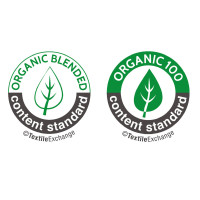
OCS – Organic Content Standard
The organic content standard (OCS) applies to any non-food product containing at least 5% organic matter.

OCS
About the standard
The Organic Content Standard (OCS):
- It is owned and administered by Textile Exchange.
- It is a voluntary international standard that provides chain-of-custody verification for materials sourced from a farm certified to recognized national organic standards.
- It allows for transparent, consistent and complete independent assessment and verification of organic content claims on products.
- It is used to verify the presence and quantity of organic matter in a final product and tracks the flow of raw materials from source to final product.
Objectives
The goal of the Organic Content Standard (OCS) is to increase organic agricultural production through three key objectives:
-
Provide the industry with a tool to verify the organic content of the products they purchase.
-
Provide companies with a reliable tool to communicate organic content claims to the industry.
-
To provide organic fiber producers with broad access to the global organic market for their products.
Scope
-
OCS certification applies to all sites in the supply chain of organically grown content: first processor, manufacturing, packaging and labeling, storage, handling and shipping through the seller in the ultimate business-to-business transaction.
-
OCS can be applied globally.
-
OCS applies to sites in the supply chain of products not intended for consumption as food or feed.
-
OCS applies to products containing at least 5% organically grown material, calculated as a percentage of the total product, excluding accessories and trimmings.
Categories
The standard is divided into 2 categories:
Documents
See the link for the process flow.
Logo usage specification

How can we help you?
Want to apply for a certification program? Our Certification team will be happy to help you.